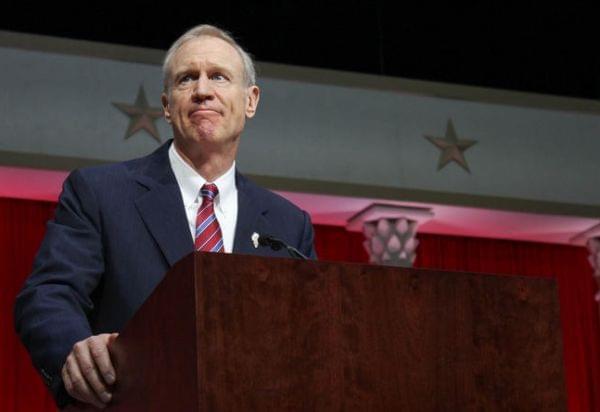For Illinois Republicans, A One-Man Party

Since his inauguration in 2015, Gov. Bruce Rauner has become the dominant force in Illinois Republican politics. Brian Mackey / WUIS
You’ve probably heard of a one-party state, but what about a one-man party? One man setting the agenda. One man calling the shots. And perhaps most importantly, one man writing the checks.
TRANSCRIPT:
As Illinois Republicans rallied in Springfield Wednesday (August 17), it was obvious that one man is the driving force behind the state GOP. And party members seem thrilled.
For the Republican Party faithful, what was once an annual duty to be endured has been transformed into an occasion for celebration. State Rep. Jim Durkin, the House minority leader, describes the pleasure of a state fair rally when it’s his party in the governor’s office.
DURKIN: “It’s been quite a couple years, but I will say that being here on Governor’s Day is much different than Republican Day, which I’ve been to so many of them in the past. The air is a little cleaner. The food tastes a little bit better. The drink’s a little better, too. But it’s great. It’s great to be part of this great organization and this great movement in Springfield.”
For the cleaner air and better food of Governor’s Day, Durkin has just one man to thank: the man who won back the governor's office for Republicans: Bruce Rauner. Durkin did thank him, as did so many other Republicans. This is Rosemarie Long, the head of the Sangamon County GOP:
LONG: "I do want to thank our governor, Bruce Rauner, for all his efforts, for holding true to your campaign promises and standing up to Madigan's bullying tactics that have put our great state in financial crisis."
Rauner has certainly attacked House Speaker Michael Madigan, but that is not the core of the Rauner difference.
Rather, the real Rauner difference comes down to something else. Or, depending on how you look at it, millions and millions and millions of something else.
His fellow Republicans thanked him for that, too.
PORTER: "I know Bruce Rauner — he is spending gazillions of dollars."
Richard Porter is Illinois' national Republican committeeman.
PORTER: "I work with rich people. And it's fun — I like the idea of being rich. I mean, it would be a great thing to have that kind of money. But one thing you realize when you're around these folks that make a lot of money is there's only so many things you can do with money."
Secure your retirement. Make sure your kids' college is paid for. Purchase a home or nine.
PORTER: "But after that, one of the great things is you get to give it away to change the world. … We are so lucky to have Gov. Bruce Rauner, not only for his leadership and his ideas, but for his generosity of spirit and of wealth to help this state to create opportunity for people who he doesn't even know."
That vague promise of opportunity accurately describes how Rauner and his fellow Republicans would like their motivations to be thought of.
But in the short term, that money has a far more particular purpose: winning legislative seats away from Democrats.
Rauner addressed this himself, employing a familiar metaphor for the Democratic Party:
RAUNER: "The machine has pounded with their power in the past. They have outspent us two-, three-, four-to-one. Lot of legislati... — not this time. Not this time. That ain't happening. We are going toe to toe with them. In fact, we're going to do better than them."
Rauner's millions are already apparent to television viewers in select legislative districts across Illinois. Conventional wisdom has it that political advertising is best held back until after Labor Day, focused in the weeks before voters actually go to the polls. But with an essentially bottomless pool of money, Republicans have decided: Why wait?
And it's not just TV advertising, either.
RAUNER: “That machine has a ground game. Special interest groups of that machine. We are going to put together a better ground game. The biggest ground game for legislative races in Illinois. And we are going to pick up seats.”
Rauner won the governor's mansion by outspending his Democratic opponent two-to-one. But will the multi-millionaire's largesse be enough to dent the Democratic supermajorities in the Illinois House and Senate?
That question cannot be answered until November, when voters get a chance to weigh in.
